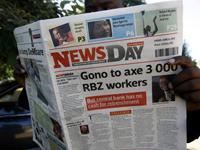BOB GARFIELD: This month, an independent daily newspaper called NewsDay was launched in Zimbabwe. That country has lacked an independent daily since 2003, when President Robert Mugabe shut the last one down. For the past seven years, the only daily newspaper has been the state-run Herald, which, unsurprisingly, has been a propaganda tool for Mugabe and his party. But after a disputed election in 2008, Mugabe entered a power-sharing agreement with opposition leader Morgan Tsvangirai, and one consequence was that licenses would now be granted to new and independent papers. A few licenses were granted at the end of May and within days Trevor Ncube, who already publishes two independent weekly papers in Zimbabwe, had NewsDay up and running. He says the public’s reaction to NewsDay has been pretty positive, but there have been a few logistical problems, among them, the price.
TREVOR NCUBE: The paper is being sold at 50 U.S. cents. In Zimbabwe we don't have coin for change, so people have one-dollar notes and they need to get 50 cents change. So we've devised a system by introducing um, coupons or tokens, which are plastic round tokens, which we give to people as change. And initially when we started, we didn't have enough of those, so that has tended to depress uh, the sales. And the other thing is that the 50 cents is not attractive to our vendors, who get a cut from selling the newspaper; they get 10 percent of the cover price. We are the cheapest newspaper at the moment, and we did that deliberately. And the vendors would rather sell a newspaper that’s one dollar or above.
BOB GARFIELD: Weren't you too clever by half? Had you charged a dollar for the paper, you would have had easier distribution and you wouldn't have had to come up with this token scheme.
TREVOR NCUBE: You've got a point. But our competition is a government newspaper that’s been around for 110 years. So we needed to come up with a strategy that would make this - our newspaper stand out. And we thought this was a very clever idea.
BOB GARFIELD: Can you give me an example of some of the stories that you have run in the last week or so or maybe one story that exemplifies exactly the kind of journalism that hasn't been done over the last seven years?
TREVOR NCUBE: There is, as I'm talking to you now, a campaign of intimidation that is taking place in Bulawayo, which is Zimbabwe’s second largest city. The government has said that uh foreign-owned companies that don't have local shareholders will be forced to take on local shareholders. And there’s been a campaign in Bulawayo over the past week of people driving into these companies to say, we now own these companies, we want you to get out of the country. So it’s that kind of story that require a bit of digging, require a bit of courage that the NewsDay is going to be dealing with.
BOB GARFIELD: The last independent daily in Zimbabwe, The Daily News, was shut down by Mugabe’s government in 2003. That office was firebombed. Tell me, over the last seven years what it’s been like for journalism in that country.
TREVOR NCUBE: We've had our journalists abducted, tortured, some of them just been caused to disappear for weeks on end. I myself have had my citizenship taken away. As I'm talking to you now, the editor of NewsDay has a case that is before the courts where, if he’s found guilty, he could spend 20 years in prison. So that’s the kind of environment. And as a result, most journalists in Zimbabwe left over the past 10 years, which poses a difficult, a challenge for us of trying to start a newspaper in a country where most of the skills have left.
BOB GARFIELD: I must say when I learned about your new enterprise, I was shocked that this regime was giving out publishing licenses to any independent entity. Was it merely the power- sharing arrangement with Tsvangirai that made this whole enterprise possible?
TREVOR NCUBE: To a large extent, it is. Currently there are targeted functions against the government of President Robert Mugabe. And the government of President Robert Mugabe has been calling on the international community to lift those functions. The Zimbabwean government needs to show commitment to democratic reform. And one of the key issues towards democratic reform is a free press, and that is contained in the global political agreement between the government of Robert Mugabe and Prime Minister Morgan Tsvangirai. So the issuing of these licenses is, in part, an attempt by the government of Robert Mugabe to show the international community that they are committed to make some, some form of reform.
BOB GARFIELD: Are you not concerned that Mugabe will wake up tomorrow morning and decide that he wants the whole lot of you in jail?
TREVOR NCUBE: Yes, you might wake up one day and find that things have been changed. But I think the changes that have been set in motion would make it rather difficult for a reversal to take place. And if indeed it does happen, it’s not something that would stop me from doing what I'm doing. I'll be proud of what we've been able to achieve, giving Zimbabweans an opportunity to read an independent daily newspaper.
BOB GARFIELD: Trevor, I wish you all the best of luck, and, and thank you very much for joining us.
TREVOR NCUBE: It’s been our pleasure. Thanks for having me.
[MUSIC UP AND UNDER]
BOB GARFIELD: Trevor Ncube is publisher of Zimbabwe’s new independent paper, NewsDay.
[MUSIC/MUSIC UP AND UNDER]

